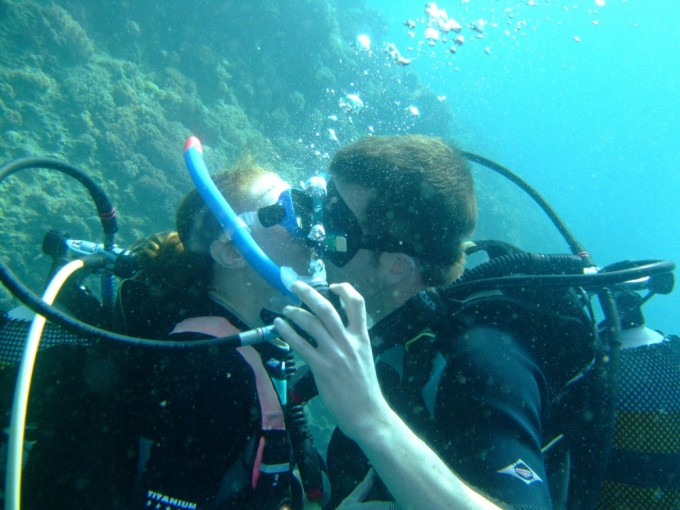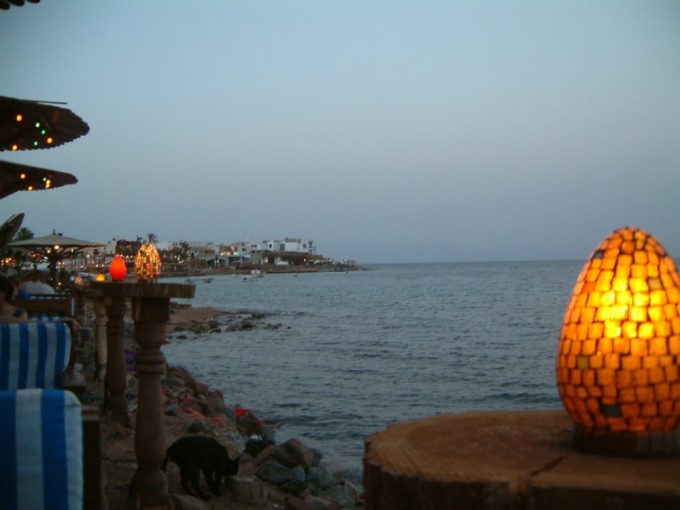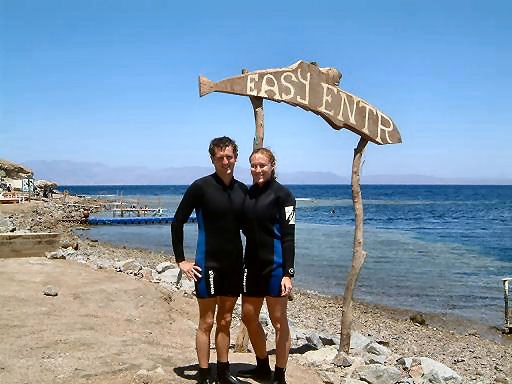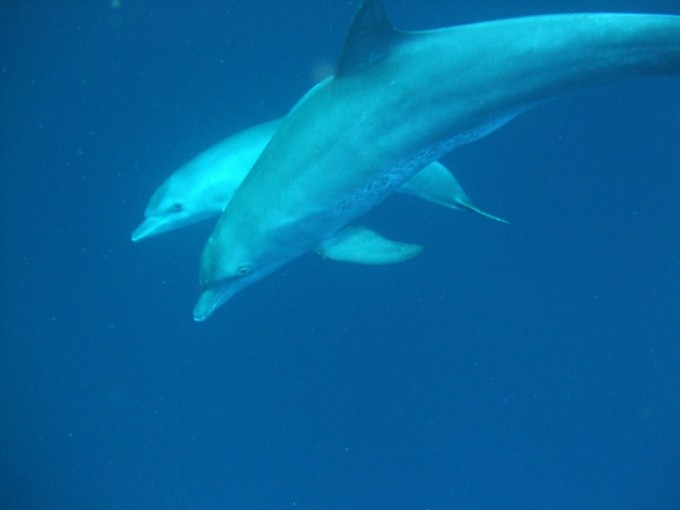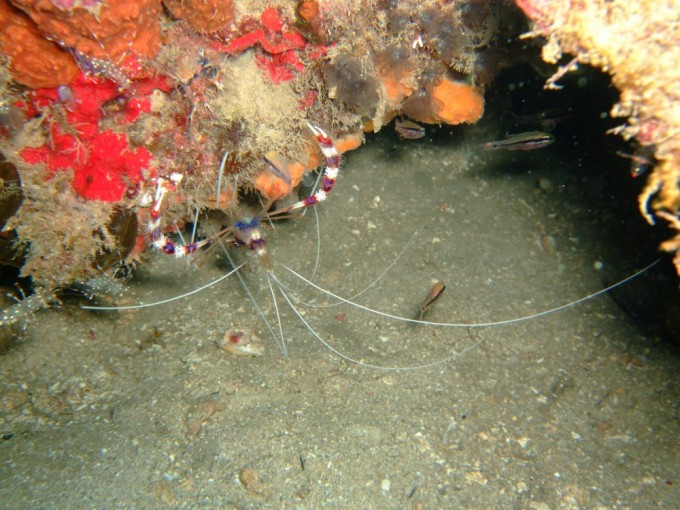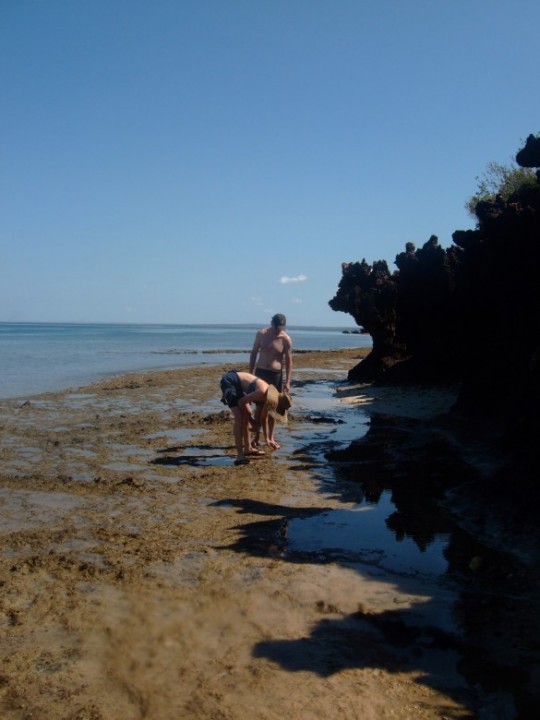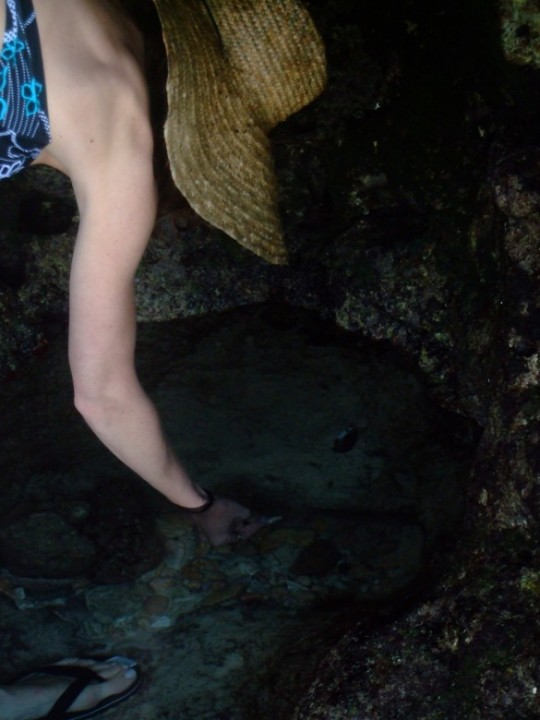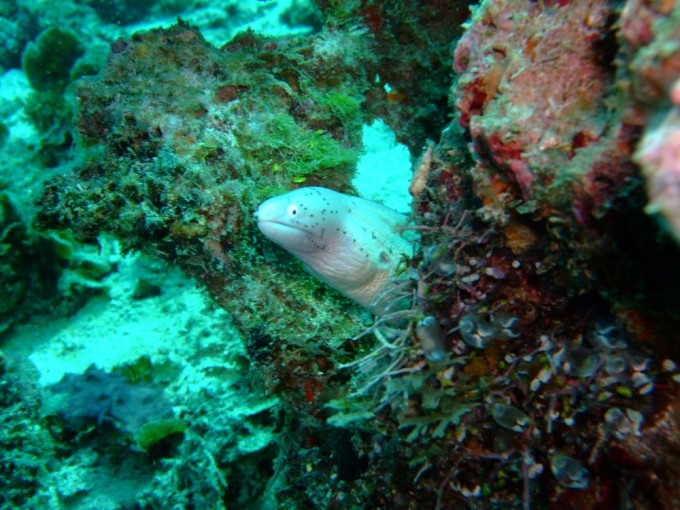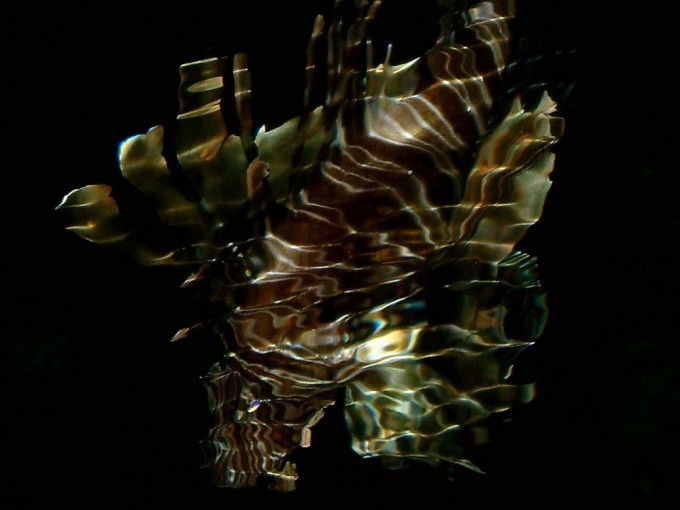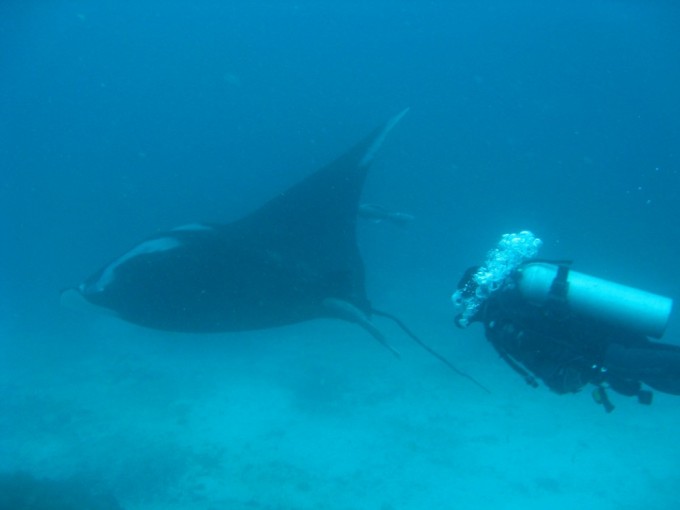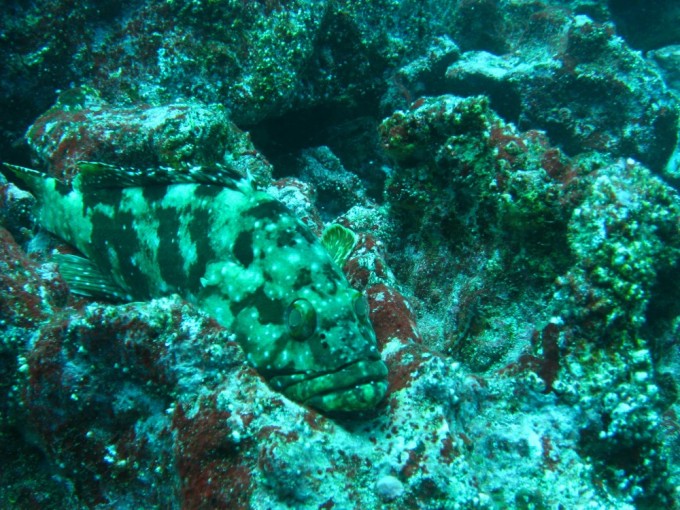Diving is the ultimate meditation; If you need to know how small you actually are, become a diver.
I have been lucky enough to dive in some of the world’s top destinations, and here are a few of my diving milestones that stand out not only for their beauty, but for the impact they had on me.
Blue Hole, Dahab, Egypt
I received my PADI certification in Dahab, doing my open-water training in some of the clearest, bluest water in the world. Dahab is the cheaper, less-known Sharm El Sheikh; the dive shops are very clean, instructors very thorough and best of all, packages are very cheap. I’m not sure if it was the new-found awe of this crazy hobby, but Egypt houses some of my favorite dive locations in the world.
Soon after receiving advanced certification, we tackled our first of many “blue holes” around the world. This one has the nickname “diver’s cemetery”, after it’s deceptive 26 meter vertical drop-in through a hole of about 6 feet wide. We Superman’ed down through this tunnel one by one, staying perfectly still while adjusting buoyancy to drop without touching the rock chute surrounding us. The hole finally opened up to 40 meter visibility, crystal blue water as far as the eye could see- nothing above, below, or around. I had never experienced vastness like this before, especially not underwater. It was the ocean and us, and whoever decided to join us along the way.
It was also Dahab that introduced me to night diving. Still newly certified, the idea of adding another element of surprise to diving seemed daunting, but off we wandered into the dark waters, armed with flashlights and curiosity. Barracudas fed by the light of our torches, fish that never see the light of day made frequent appearances, and we surfaced through a blanket of thousands of tiny jellyfish- so many that upon surfacing, our very experienced DM shouted “holy crap! What the hell? That was so cool!”

Barracuda of Belize’s Blue Hole- Photo courtesy of Ross Overstreet via http://www.uwphotographyguide.com/
We loved it here so much that after a brief stay halfway through our month in Egypt, we returned at the end of our journey to dive just a few more times.
Pemba, Mozambique:
As our honeymoon through Africa began in Pemba, we dropped our luggage and headed straight to the dive shop- a shack on the beach with the phone number of the divemaster scrawled on the door. Despite the shabby exterior, the equipment was new, and the friendly 25-year old South African that would be taking us out had been travelling up coastal Africa for a year. We would be the only two divers accompanying him the next day, which we didn’t mind at all.
We loaded our gear onto the small motorboat and headed out to sea. As we voyaged towards the first dive site, a pod of dolphins appeared on the horizon and our DM shouted “Quick- get in and entertain them!” I have never moved so fast in my life. Splashing, twisting and making silly sounds we thought the pod would like, they mirrored our actions around us for about 15 minutes. They apparently liked our silly dances, and granted us their presence for much longer than I would have if I were as beautiful as they.
Time to dive. We suited up properly and descended into surprisingly clear, still water chock full of micro and macro life. Nudibranches, turtles, glass shrimp, eels…everywhere we turned, there was something new.
Our surface interval was also an adventure. This adventurous South African had made it his mission to thoroughly explore every inch of the island where we would wait in between dives. It was his domain, and he was its king. He showed us the ropes, pointing out all the amazing things he had learned. He had befriended an eel living in one little cave, which actually came when he called so he could feed it oysters from the bed. I also ate one of those oysters, so I know why the eel came so quickly.
On our second dive, I had a bit of a dive paradigm-shift. While descending, we noticed a large fishing net had entangled everything in its path, and lodged itself on a large coral mass. The three of us worked together to untangle the net, freeing the coral and bringing the ensnared garbage up with the net. Our boat captain grabbed the net from us, and we resumed our dive, satisfied that we had done one small thing to preserve the ocean we love.
Though “no impact” diving had always been integral to my practice- no touching, no leaving or taking anything- why not dive with positive impact instead and do something to help on every single dive?
Red Hook, St Thomas
This was another “bigger picture” dive. My coworker recommended a dive shop she used to work in, with a reputation for being conservation oriented. Their crusade- combating Lionfish. This invasive species has become a worldwide problem, rapidly reproducing and growing a very large appetite, but free from predators as they are also poisonous. This dive shop regularly conducts clean-up dives, but instead of garbage, they were cleaning up the Lionfish. On our dive, the DM carried a long spear gun, and would routinely stalk large Lionfish, spear them, and cut them into tiny pieces for the other fish to eat. Sounds vicious? So are the Lionfish.
This mission is difficult because of a general lack of awareness of the problem, and people have trouble seeing something so beautiful as a threat. There is even a push to make this fish’s meat more palatable, but preparation requires training, as does their hunting. With the help of dive shops and conservation education, the many threats to ocean ecosystems can be curbed for future divers and non-divers alike. Read more about Caribbean Oceanic Restoration and Education (CORE) and Reef Guardian’s Caribbean Lionfish response here.
Santa Cruz, Galapagos, Ecuador
We had just completed our Rescue Dive Certification in preparation for this trip, newly geared up with Dive sausages, knives, and a brand new dive camera. Something else I inherited- fear. My Rescue Dive Instructor had used his time with us to regale us with stories of near-death experiences, treating our training like his “big fish” forum. I resented him for corrupting my pure love of diving with seeds of insecurity, and felt a nervousness I had never before experienced in my dive life. Not wanting to lose something I loved, I persisted.
The boat ride out to our dive site was choppy (to put it nicely), and the drop-in was very rough. SO rough, that the waves grabbed our new camera right out of Matt’s hand, to be gobbled up by a sea witch.
The current was strong, and I struggled to not get swept away. My air was running out quickly, and the DM decided that I should take another girl back to the boat (instead of my buddy, Matt) while the other men stayed down a while longer. Biggest mistake: I listened. The two of us ascended slowly, pausing for a mandatory safety stop. That’s when she ran out of air. We buddy breathed at the best depth we could approximate, but with the choppy water, we were getting churned. I used my brand new safety sausage when we surfaced, and the boat master came to pluck us from the froth.
I learned a lot that day. When I saw that little French girl give the “all out” signal, I fully realized the necessity of fear/respect for the sea. Moreover, a respect for your own intuition is the most valuable training you can have. I will never again blindly follow someone I have just met, and if my gut says “no”, I listen.
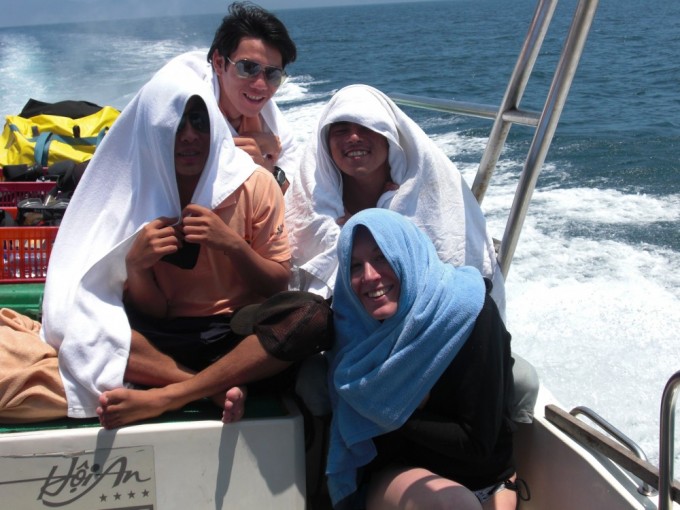
Dive crew in Vietnam- while very sweet, the equipment was rundown, and we really triple checked all the decisions were being made about our safety- even sun care.
Lastly, I believe that Dive instructors have a great responsibility not only to dispense factual information, but to prepare their students for whatever might come their way- even internal struggle. Training can quickly be suffocated by paralyzing fear, and both students and instructors should weigh the mental preparedness as highly as physical capabilities. Fear can be good, but can also be incapacitating. Instructors should remember this before bragging about “That one time….” and always emphasize solutions more than problems. I will do my best to do the same.

